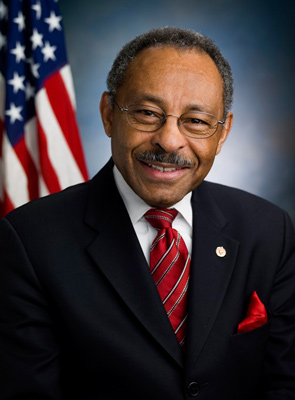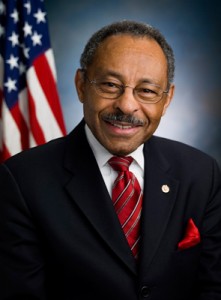Roland Burris, a longtime Illinois state official, was named to succeed former Senator and President-elect Barack Obama on December 31, 2008, becoming the sixth African American to serve in the United States Senate.1 Burris started his political career as a teenager at a swimming pool in his hometown of Centralia, Illinois, in the south central part of the state. Burris’s father, who was vice president of the local chapter of the NAACP, had his son and four friends racially integrate the pool after a two-year struggle. The successful effort made Burris focus on law and politics: “If we, as a race of people, are going to get anywhere in this society, we’ve got to have lawyers and elected officials who are responsible and responsive–that’s what my dad said, and it resonated with me.”
Roland W. Burris was born on August 3, 1937, in Centralia, the youngest of Earl L. and Emma M. Burris’s three children. His father was a railroad laborer. Burris graduated from Centralia High School, and later earned a degree in political science from Southern Illinois University in Carbondale in 1959. In 1963, Burris earned a law degree from Howard University in Washington, D.C., after an exchange program in Hamburg, Germany. Burris worked as a federal bank examiner following graduation from law school and then as a bank vice president. From 1973-1976, he was director of the Illinois State Department of General Services in the cabinet of Governor Daniel Walker.3 Burris married Berlean Miller in 1961, and they raised two children, Rolanda and Roland II.
Burris made his first bid to be Illinois’s comptroller in 1976, losing in the Democratic Party primary to eventual winner Michael Bakalis.4 When Bakalis sought the Illinois governorship in 1978, Burris ran to succeed him as comptroller.5 Burris won 52 percent of the vote and defeated Republican John W. Castle–a former local government affairs official for the state–in the November 7, 1978, general election. He became the first African American elected to statewide office in Illinois.6 Burris was re-elected twice and served as comptroller from January 1979 to January 1991.7 In 1990, Burris was elected Illinois state attorney general and served until 1995, after his first unsuccessful bid to be the Democratic nominee for governor.
Burris made two additional attempts to be governor of Illinois in 1998 and 2002 but came up short of his party’s nomination each time. He worked as a lawyer and political consultant after placing third in the 2002 Democratic gubernatorial primary.8 Governor Rod Blagojevich, who defeated Burris, Bakalis, and Paul Vallas in that primary, selected Burris to fill the unexpired term of former Senator Obama on December 31, 2008. The appointment came just three weeks after a federal prosecutor had arrested Blagojevich for attempting to sell the seat. Despite the controversy and heightened scrutiny, Burris denied wrongdoing associated with Blagojevich and accepted the appointment.
Multiple investigations at the state and federal levels followed, and Burris was never formally charged with misconduct. After initially refusing to do so, the Illinois secretary of state approved the appointment on January 9, 2009, and the Senate considered Burris’s credentials in order three days later.9 Vice President Dick Cheney administered the oath of office to Burris in the Senate on January 15, 2009.10
Burris served on the Armed Services, Homeland Security and Governmental Affairs, and Veterans’ Affairs committees.11 In the Senate, Burris supported President Obama’s legislative agenda, including economic stimulus legislation, and the repeal of Don’t-Ask-Don’t-Tell. He also supported representation for the District of Columbia in the Senate.12
Burris did not seek election to a full term, and he was succeeded in the Senate by Representative Mark Kirk, who won a November 2, 2010, special election to fill the remainder of the vacant term and a new six-year term at the same time. Kirk took the oath of office on November 29, 2010. Burris retired to his home in Chicago.13
In his farewell remarks, Burris said it had been a dream of his to serve in the Senate: “That dream took longer to achieve than I could have imagined . . . but in a towering testament to the vibrancy of the American dream, that day came. After decades of experience in the executive branch of Illinois government, I was sworn in as a Senator for Illinois, and this became my first introduction to serving as a legislator. It was the steepest of learning curves, but with the warm assistance of my Senate colleagues, the steady support of my loving family, and the dedication of my tireless staff, I could not be more proud of what we have been able to accomplish together.”14
Further Reading
“Burris, Roland,” Biographical Directory of the U.S. Congress, 1774-Present,http://bioguide.congress.gov/scripts/biodisplay.pl?ndex=B001266.
Manuscript Collections
Southern Illinois University, Special Collections. Papers: ca. 2009-2010, ca. 100 cubic feet. Correspondence, speeches, research files, drafts of legislation, electronic records, photographs, and artifacts.
Footnotes
- Congressional Record, Senate, 111th Cong., 1st sess. (15 January 2009): S563.
- Jeffrey Toobin, “The Replacement: The Rise of Roland Burris,” 23 March 2009, The New Yorker, http://www.newyorker.com/reporting/2009/03/23/090323fa_fact_toobin (accessed 26 March 2012).
- “Sen. Roland W. Burris,” Politics in America, 2010 (Washington, D.C.: Congressional Quarterly Inc., 2010): 326.
- Neil Mehler, “Thompson victor in GOP race,” 17 March 1976, Chicago Tribune: 1.
- The 1970 Illinois state constitution altered election timing, so statewide offices elected in 1976 served two-year terms. See Edith Herman, “Con-Con Unit OK’s Off-Year Election Plan,” 23 April 1970,Chicago Tribune: 6.
- “State of Illinois Official Vote Cast at the General Election November 7, 1978,” State Board of Elections, http://www.archive.org/details/officialvote78illi (accessed 26 March 2012).
- “History,” Illinois Office of the Comptroller, http://www.ioc.state.il.us/index.cfm/about-our-office/history/ (accessed 27 March 2012).
- Michael Barone and Richard E. Cohen, The Almanac of American Politics (Washington, DC: National Journal, 2010): 494.
- Perry Bacon, Jr., “Senators Turn Burris Away at Capitol; But Democrats Are Now Considering Allowing Blagojevich Appointee to Serve,” 7 January 2009, Washington Post,: A01.
- For more, see Jessica McHugh, “Roland Burris,” Current Biography, Vol. 70, No. 6 (June 2009): 9-15.
- Toobin, “The Replacement: The Rise of Roland Burris.”; Politics in America, 2010: 325.
- Carol Felsenthal, “Roland Burris: No Regrets on Accepting Senate Seat from Blagojevich,” http://www.chicagomag.com/Chicago-Magazine/Felsenthal-Files/April-2011/Roland-Burris-No-Regrets-on-Accepting-Senate-Seat-from-Blagojevich/ (accessed online 27 March 2012); Dana Milbank, “Seeking Representation – but Probably Not From Burris,” Washington Post, 26 February 2009: A03; Jennifer Bendery and Shira Toeplitz, “House Leaders Plot Gay Rights Agenda,” Roll Call, 25 June 2009.
- Felsenthal, “Roland Burris: No Regrets on Accepting Senate Seat from Blagojevich.”
- Congressional Record, Senate, 111th Cong., 2nd sess. (18 November 2010): S8011.

